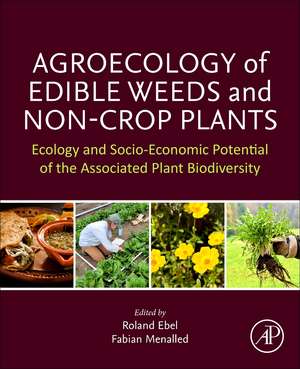Agroecology of Edible Weeds and Non-Crop Plants: Ecology and Socioeconomic Potential of the Associated Plant Biodiversity
Editat de Roland Ebel, Fabian Menalleden Limba Engleză Paperback – 24 sep 2024
Those interested in increasing the diversity of the farming landscape and food systems by means of edible non-crop plants have access to a plethora of information on the ethnobotany of these species. Yet little to no information exists on the agroecological requirements and potential benefits of underutilized edible non-crop plants in the context of sustainable farming systems. This book fills that knowledge gap from identifying edible weeds and non-crop plants, to exploring the ways these plants can be used to economically improve nutrition.
- Evaluates ecological processes underpinning the abundance and diversity of edible non-crop plants
- Assesses ecological benefits of these species within agroecosystems
- Identifies socioeconomic barriers and incentives in exploiting consumable agricultural biodiversity
- Highlights real-world insights through case studies
Preț: 674.74 lei
Preț vechi: 880.38 lei
-23% Nou
Puncte Express: 1012
Preț estimativ în valută:
129.14€ • 134.32$ • 108.22£
129.14€ • 134.32$ • 108.22£
Carte tipărită la comandă
Livrare economică 06-20 martie
Livrare express 06-12 februarie pentru 264.67 lei
Preluare comenzi: 021 569.72.76
Specificații
ISBN-13: 9780443160769
ISBN-10: 0443160767
Pagini: 340
Dimensiuni: 191 x 235 mm
Greutate: 0.7 kg
Editura: ELSEVIER SCIENCE
ISBN-10: 0443160767
Pagini: 340
Dimensiuni: 191 x 235 mm
Greutate: 0.7 kg
Editura: ELSEVIER SCIENCE
Cuprins
1 Ecological principles in the study of edible weeds
2 Are we fighting our coevolutionary partners?
3 Developing ecological and socioeconomic criteria to diversify weed use for food
4 Impacts of edible weeds on other components of the associated biodiversity
5 Edible weeds as crops
6 Edible weeds as a component of a resilient food system
7 Weeds as a social construct
8 The economy of edible weeds: evidence and conceptual framework
9 Teaching edible weeds in higher education: examples from Montana State University’s sustainable food systems program
10 Edible exotic weeds for food security and food sovereignty in NW Patagonia
11 “Quelites”: the culture of edible weeds in Mexico
12 Descurainia sophia (flixweed): a weed with many uses and ecological roles
13 Itajetik: Agroecology and food culture of edible noncrop plants of the Tseltal Maya in northern Chiapas
14 Food beyond the farm: significance of noncrop plants and mushrooms for food security of highland farming communities in Veracruz, Mexico
15 Agroecology of edible weeds in India
16 Epilogue: Harnessing the diversity of our fields. Lessons that edible weeds can teach us
2 Are we fighting our coevolutionary partners?
3 Developing ecological and socioeconomic criteria to diversify weed use for food
4 Impacts of edible weeds on other components of the associated biodiversity
5 Edible weeds as crops
6 Edible weeds as a component of a resilient food system
7 Weeds as a social construct
8 The economy of edible weeds: evidence and conceptual framework
9 Teaching edible weeds in higher education: examples from Montana State University’s sustainable food systems program
10 Edible exotic weeds for food security and food sovereignty in NW Patagonia
11 “Quelites”: the culture of edible weeds in Mexico
12 Descurainia sophia (flixweed): a weed with many uses and ecological roles
13 Itajetik: Agroecology and food culture of edible noncrop plants of the Tseltal Maya in northern Chiapas
14 Food beyond the farm: significance of noncrop plants and mushrooms for food security of highland farming communities in Veracruz, Mexico
15 Agroecology of edible weeds in India
16 Epilogue: Harnessing the diversity of our fields. Lessons that edible weeds can teach us
